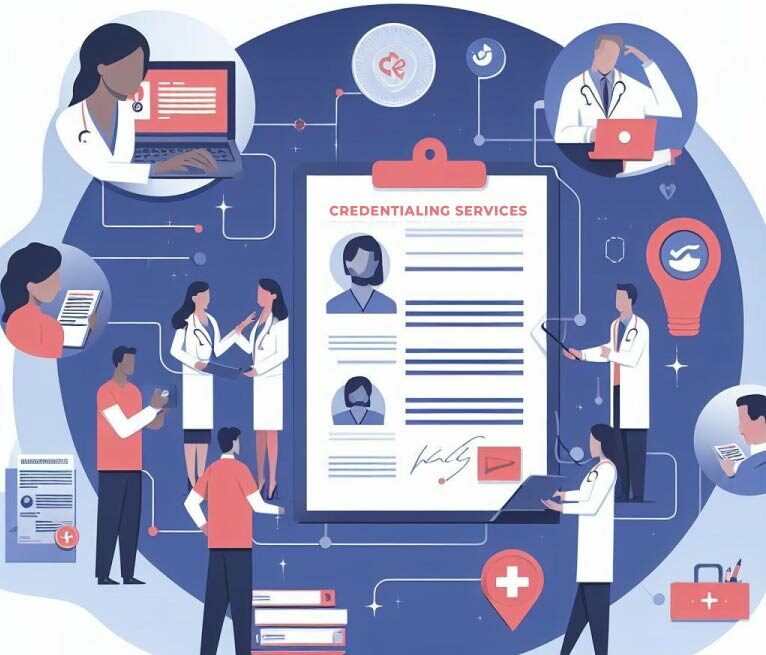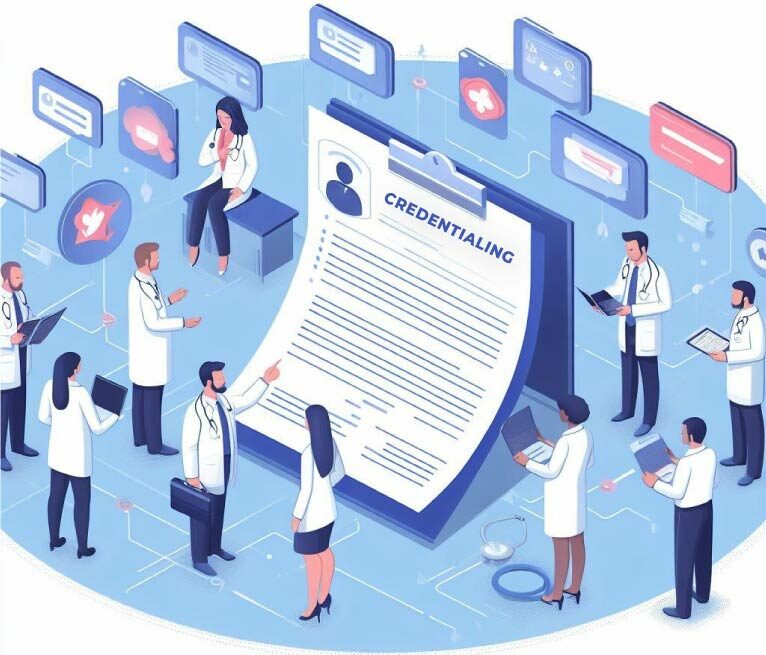
The Vital Role of Credentialing Consultants in Healthcare
Healthcare providers aim to deliver the highest quality patient care. To achieve this goal, healthcare organizations must ensure their physicians and other practitioners are properly credentialed. This critical process validates the qualifications, competence, and expertise of medical staff.
Credentialing allows healthcare facilities to verify that providers have the proper licensure, education, training, and other qualifications required to practice medicine. Proper credentialing is essential for delivering exceptional patient care and maintaining compliance with industry regulations. It also impacts reimbursements from insurance companies.
While healthcare organizations handle credentialing in-house, the complex process can become burdensome. As a result, many facilities partner with dedicated credentialing consultants to simplify and streamline the credentialing process.
The Importance of Credentialing in Healthcare
Credentialing plays a fundamental role in healthcare by upholding standards across the industry. Specifically, it:
Ensures patient safety
Confirming that providers have adequate qualifications minimizes the risk of providers delivering subpar medical care. This, in turn, reduces the likelihood of medical errors that could potentially harm patients.
Upholds quality of care
Stringent credentialing procedures ensure practitioners meet professional competency standards. This maintains the exceptional quality of care across healthcare organizations.
Meets industry regulations
Healthcare accreditation organizations like The Joint Commission require medical facilities to implement credentialing. This maintains industry compliance.
Enables insurance reimbursement
Insurance companies require practitioners to be fully credentialed before reimbursing for services. This enables facilities to receive proper payments.
With credentialing essential for delivering quality patient care, partnering with experienced credentialing consultants makes the process more seamless.
The Role of Credentialing Consultants
Credentialing consultants are professionals who specialize in managing the credentialing process for healthcare organizations. They aim to simplify credentialing while ensuring full compliance.
Responsibilities of Credentialing Consultants
The key responsibilities of credentialing consultants include:
Collecting credentials
Gather all required documents and information from practitioners, including licenses, certifications, education history, work history, malpractice coverage, and more.
Verifying credentials
Contact all necessary institutions to authenticate the practitioner's credentials are valid and up-to-date.
Compiling files
Organize all credentialing documents into a consolidated file for each provider.
Managing applications
Complete and submit credentialing applications on the practitioner's behalf.
Tracking status
Monitor the status of applications and follow up as needed throughout the approval process.
Updating records
Keep practitioner credentialing records up to date through re-credentialing.
Ensuring compliance
Verify that all credentialing meets industry standards and accreditation requirements.

The Value of Credentialing Consultants
Partnering with credentialing consultants brings immense value to healthcare organizations, including:
Saving time and resources
Managing the intensive credentialing process in-house requires extensive time and effort. Consultants handle the workload, allowing facilities to focus on patient care.
Increasing efficiency
Consultants streamline the end-to-end credentialing process through expertise and best practices. This yields faster credentialing turnaround times.
Improving compliance
Consultants are credentialing experts monitoring industry changes. They ensure organizations meet all requirements, avoiding penalties.
Maximizing revenue
By ensuring practitioners are credentialed properly, consultants enable maximum insurance reimbursement.
Understanding the Credentialing Process
To appreciate the vital role of credentialing consultants, it helps to understand the key steps involved in the credentialing process.
7 Main Steps of Credentialing
Credentialing involves several important phases:
1. Collecting credentials
Gather all required documents from the practitioner, including licensure, certifications, education and training, work history, malpractice coverage, and more.
2. Verifying credentials
Contact all necessary institutions to confirm the practitioner's credentials are current and valid.
3. Compiling files
Organize the credentialing documents into a consolidated file or profile for each provider.
4. Completing applications
Fill out all necessary credentialing applications on behalf of the practitioner. Each facility has its own application.
5. Submitting applications
Send completed applications to each healthcare organization's credentialing department.
6. Following up
Check in on the status of applications and provide any missing information requested throughout the approval process.
7. Updating records
Conduct re-credentialing every 1-2 years to keep practitioner files current.
3 Key Points in the Credentialing Timeline
- Initial credentialing begins when a practitioner joins the medical staff. The full process generally takes 1-3 months.
- Recredentialing occurs every 1-2 years, depending on the facility. This involves updating expired documents.
- Credentialing consultants guide practitioners through the process from initial credentialing through ongoing re-credentialing.
With numerous steps involved, consultants are invaluable for navigating the credentialing process efficiently.
How Credentialing Consultants Ensure Compliance
Healthcare organizations partner with credentialing consultants to guarantee their processes meet industry regulations. Consultants provide in-depth expertise to maintain compliance in key areas.
Confirming Practitioner Qualifications
Credentialing consultants take steps to verify that healthcare practitioners hold the necessary qualifications to provide quality care, including:
Licensure
Check that the provider holds a current, valid license to practice in the state.
Board certification
Verify certification in the practitioner's specialty from the appropriate medical board.
Education and training
Confirm the practitioner completed an accredited medical degree program and residency.
Work history
Validate past work experience at healthcare facilities.
Malpractice coverage
Ensure adequate current malpractice insurance according to state and facility requirements.

Evaluating and Screening Practitioners
In addition to verifying qualifications, credentialing consultants also conduct rigorous screening to further protect patients:
Malpractice claims review
Check the National Practitioner Data Bank for malpractice settlements or adverse actions against the provider.
Sanctions review
Check federal databases for any exclusions or sanctions against the practitioner.
Hospital privilege history
Verify that the provider had no issues with hospital privileges being denied or revoked.
Thorough verification and screening by credentialing consultants provide crucial protection for patients and medical facilities.
How Credentialing Impacts Quality Care
While often behind the scenes, proper credentialing from consultants has a significant influence on patient care and safety.
Safeguarding Quality of Care
Complete, accurate credentialing ensures providers have adequate qualifications to deliver exceptional care. Key ways it protects care quality include:
Confirming competency
Thorough verification of education, training, experience, and competency maintains skilled providers.
Meeting specialty standards
Specialty board certification ensures physicians meet the highest standards in their field.
Reducing negligence
Comprehensive screening identifies providers who may provide subpar or unsafe care.
Upholding ethics
Reviewing sanctions and disciplinary history identifies unethical or unprofessional conduct.
Reducing Medical Errors
Stringent credentialing standards minimize the risk of providers committing dangerous medical errors such as:
- Misdiagnoses resulting from inadequate assessment and critical thinking.
- Medication errors from lack of pharmacological knowledge.
- Surgical mistakes due to deficient technical skills.
- Improper treatment stemming from subpar clinical judgment.
Complete credentialing provides the foundation for reducing these errors and protecting patient safety.
The Financial Impact of Credentialing
In addition to upholding quality, proper credentialing from consultants also greatly impacts healthcare organizations financially.
Maximizing Insurance Reimbursement
Insurance companies require practitioners to complete facility-specific credentialing in order to reimburse services. This enables organizations to receive full payments owed for patient care services.
Complete credentialing also enables contract negotiation with insurance plans. This allows for expanding the services covered and raising reimbursement rates.
Avoiding Financial Penalties
Noncompliance with industry credentialing standards can result in hefty financial penalties from regulators and accreditors.
Common penalties for deficient credentialing include:
- Regulatory fines often total thousands of dollars.
- Lost accreditation, resulting in a lower facility reputation and fewer patient referrals.
- Probationary status jeopardizes the ability to participate in insurance networks.
Credentialing consultants enable organizations to avoid these penalties through guidance on meeting all requirements.
The Role of Technology in Credentialing
While credentialing has traditionally been an entirely manual process, technology is transforming the approach in significant ways.
Improving Efficiency
New software provides powerful automation to speed up repetitive aspects of credentialing like:
- Automatically collecting data from primary sources
- Digitally transferring documents between facilities
- Managing expiration and renewal dates
This automation improves productivity, allowing consultants to take on more credentialing volume.
Enhancing Compliance
Specialized software includes built-in checks to ensure all standards are met:
- Alerts for expired or invalid credentials
- Tracking for pending renewals and follow-ups
- Automatic form population from verified data
These features enhance compliance, reducing the risk of any errors.
Increasing Accuracy
Digital credentialing systems improve accuracy by:
- Pulling real-time data from primary sources
- Eliminating reliance on manual data entry
- Reducing the potential for human error
Higher accuracy translates to more precise, up-to-date credentialing.
New technology allows consultants to credential higher volumes with greater efficiency, compliance, and accuracy.

Case Study: AltuMED
AltuMED demonstrates a successful approach to healthcare credentialing. The organization offers end-to-end credentialing paired with compliance expertise.
Increasing Accuracy
AltuMED handles the entire credentialing process, from initial applications through ongoing re-credentialing. Services include:
- Collecting all required documents
- Contacting primary sources for verification
- Submitting error-free applications
- Providing status updates and issue resolution
This comprehensive approach minimizes the workload for healthcare organizations.
Regulatory Expertise
AltuMED stays current on the latest standards from regulators like the NCQA, URAC, and Joint Commission.
This expertise ensures that healthcare organizations select compliant processes that avoid penalties. It also maximizes reimbursement through proper payor credentialing.
Customer-Focused Service
AltuMED’s credentialing prioritizes communication and partnership with healthcare organizations. Consultants provide high-touch support addressing unique needs.
This customer focus results in efficient, tailored credentialing that exceeds expectations.
The Verdict: The Critical Need for Credentialing Consultants
With countless steps and changing standards, credentialing is a challenging yet essential process in healthcare. Credentialing consultants fill a vital role in taking this burden off healthcare facilities.
Consultants handle every aspect of credentialing while ensuring full compliance with regulations. This maximizes revenue through insurance reimbursements and avoids large penalties.
Most importantly, dedicated credentialing experts uphold provider standards so that patients consistently receive exceptional, ethical care. The result is safer medical practices and healthier communities.
To learn more about partnering with a trusted credentialing consultant, contact the experts at AltuMED.
Subscribe to Our Newsletter!
Subscribe to Our Newsletter!
Enter Your Email Address. We Promise We Won't Spam You

